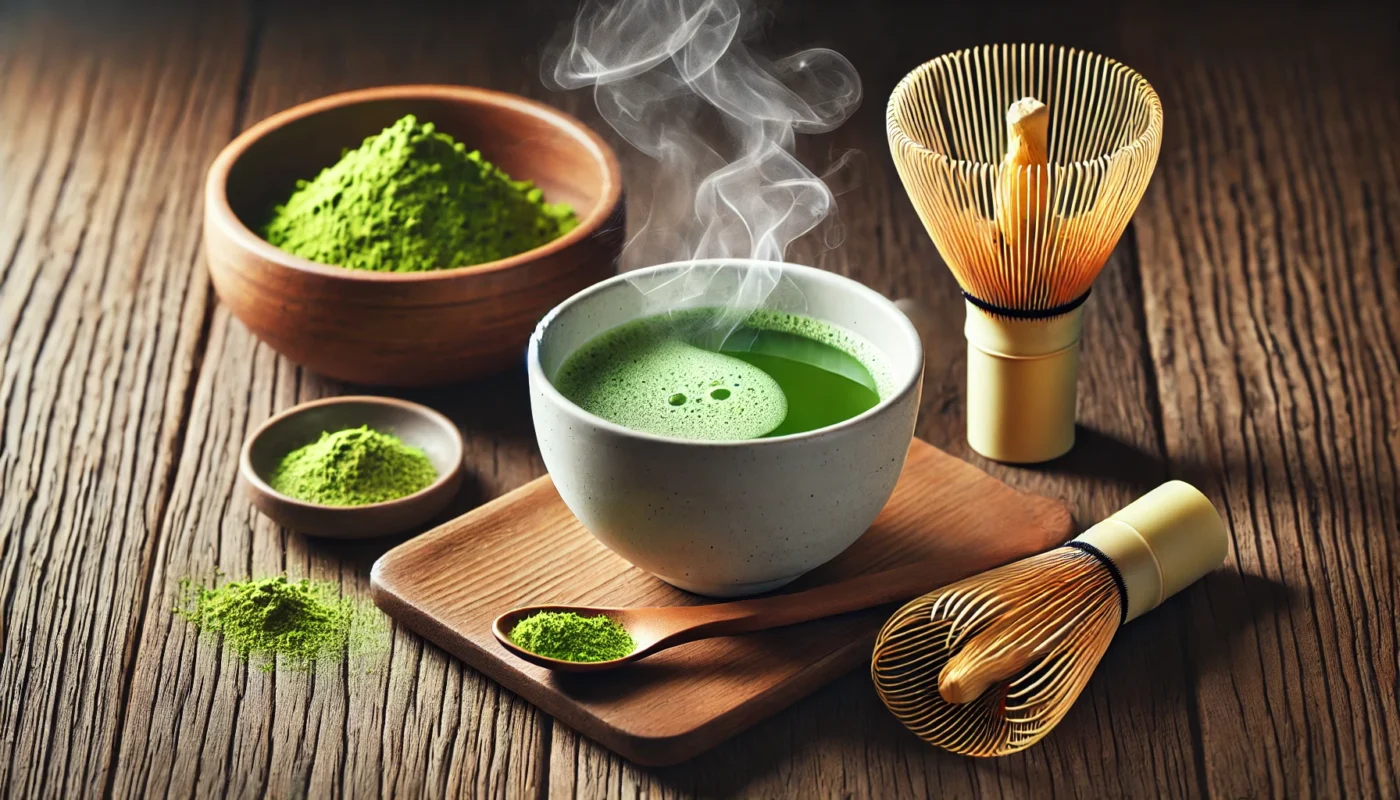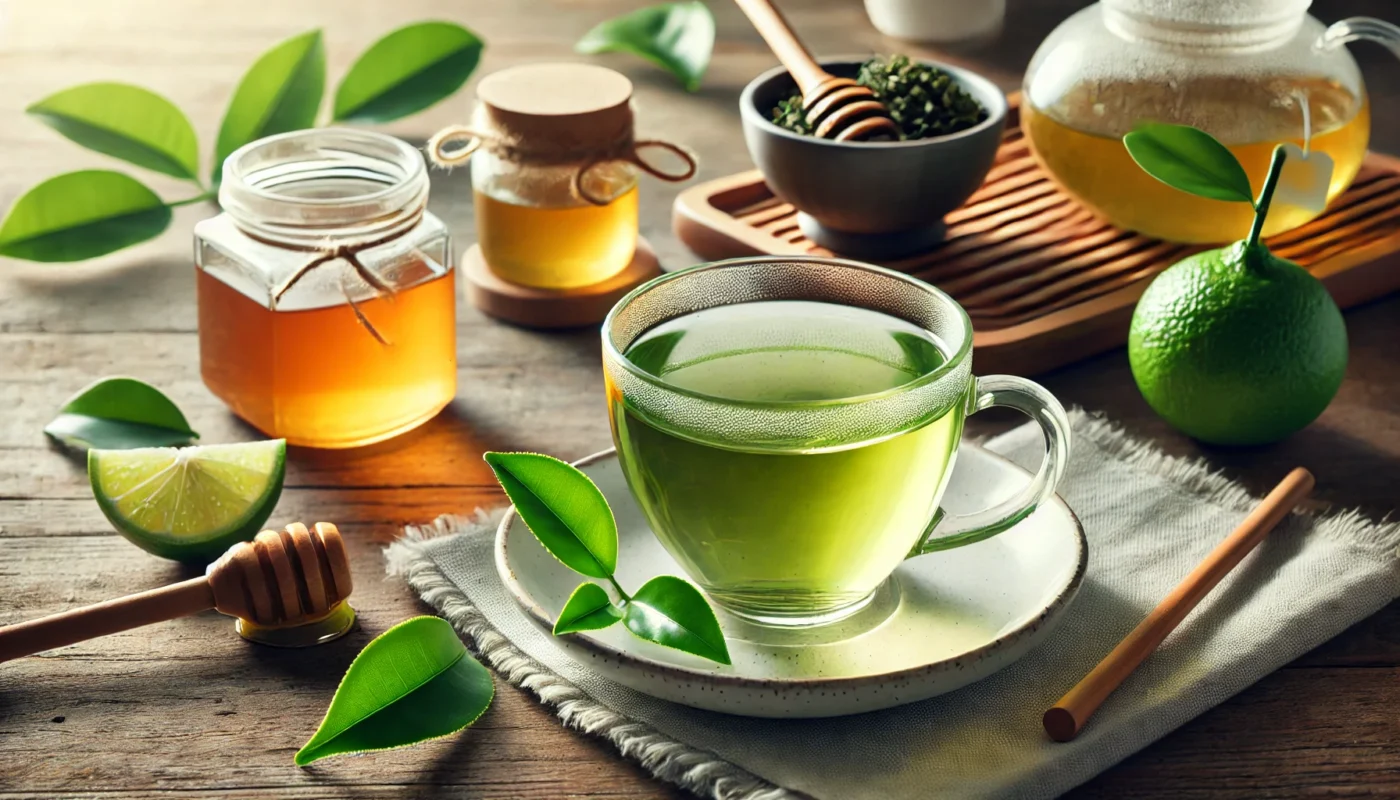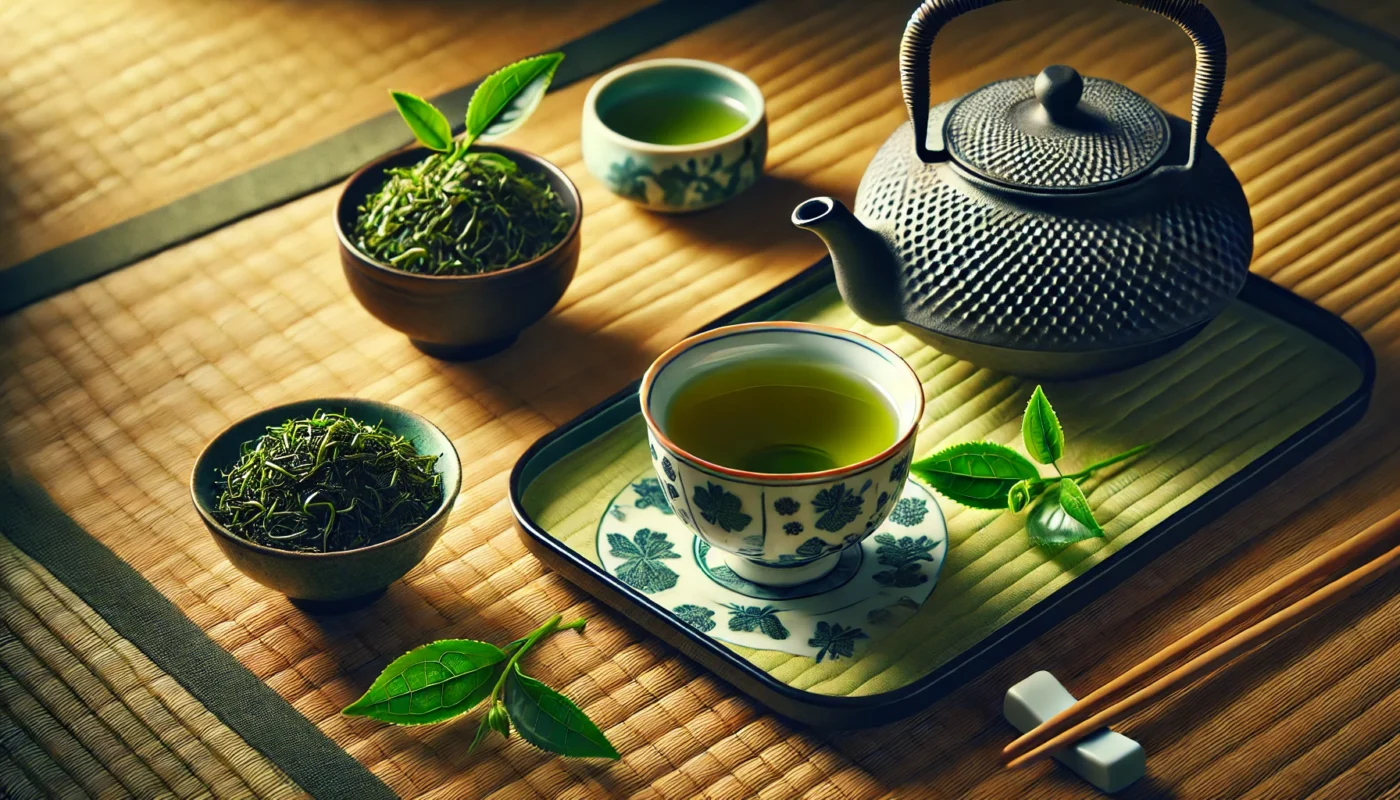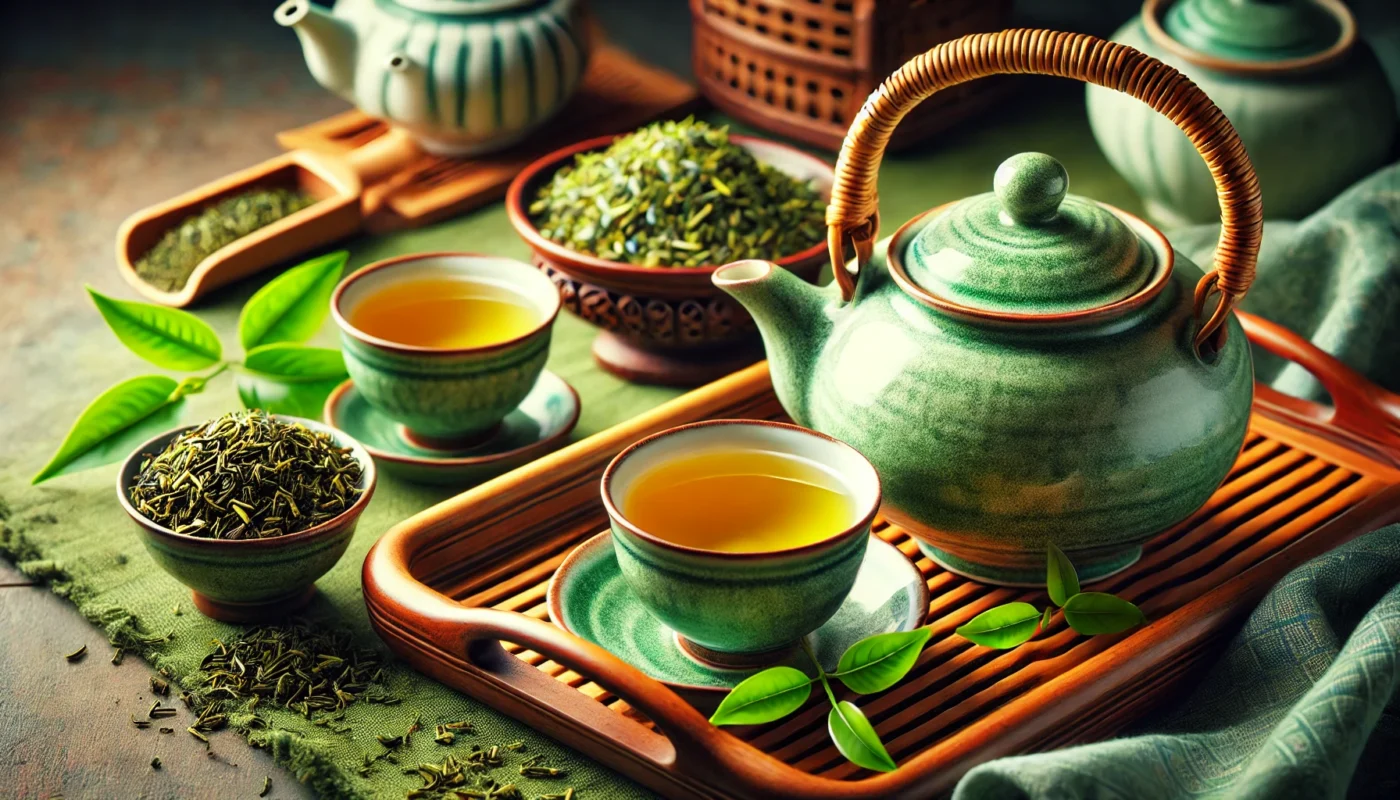Inflammation is a common health concern. It’s a natural response of the body to injury or illness, but when it becomes chronic, it can lead to serious health issues.
Enter green tea. This ancient beverage, revered in cultures around the world, is more than just a soothing drink. It’s packed with potent compounds that have been shown to combat inflammation.
But not all green teas are created equal.
Some varieties are particularly rich in anti-inflammatory properties. They can be a powerful ally for fitness enthusiasts, health aficionados, and medical patients seeking natural ways to manage inflammation.
This article will guide you through the top green teas for reducing inflammation.
We’ll delve into the science behind their benefits, how to brew them for maximum effect, and how to incorporate them into your daily routine. We’ll also touch on potential interactions and side effects, and share real-life success stories.
So, whether you’re a seasoned tea drinker or a curious newcomer, read on. Discover how the best green teas can help you combat inflammation and enhance your wellbeing.
You May Also Like: Natural NSAIDs: Benefits and Side Effects
Understanding Inflammation and Its Effects on Health
Inflammation is the body’s defense mechanism. It kicks in when your immune system detects invaders like bacteria or viruses. This process helps in healing injuries and fighting infections.
However, inflammation isn’t always beneficial. When it persists, it becomes chronic and can lead to various health issues.
Chronic inflammation is linked to diseases such as arthritis, heart disease, and diabetes. It can also affect mental health, contributing to conditions like depression.
Recognizing inflammation involves understanding its signs. These include redness, swelling, pain, and a decrease in the range of motion in affected areas.
The effects of inflammation can be widespread. They can range from fatigue and body aches to more severe symptoms, depending on the underlying condition.
It’s important to manage inflammation effectively. Here are some key points to consider:
- Diet: A balanced diet rich in anti-inflammatory foods can help.
- Exercise: Regular physical activity aids in reducing inflammation.
- Lifestyle: Stress management and adequate sleep are also crucial factors.
Understanding these aspects helps in taking a proactive approach to health. By focusing on lifestyle changes, you can reduce the impact of chronic inflammation on your life.

The Science Behind Green Tea’s Anti-Inflammatory Properties
Green tea is celebrated for its many health benefits, especially its anti-inflammatory properties. These benefits stem largely from its rich content of bioactive compounds. The most prominent of these compounds are polyphenols, which are known to reduce inflammation.
Among the polyphenols, epigallocatechin gallate (EGCG) stands out as the most potent. EGCG is a type of catechin with strong antioxidant properties. It helps to neutralize free radicals, which in turn reduces oxidative stress and inflammation in the body.
Research has shown that EGCG can actively inhibit the production of inflammatory substances in the body. This effect is particularly beneficial for people with inflammatory conditions like arthritis. Studies suggest that regular consumption of green tea can help manage pain and inflammation in such conditions.
Additionally, the antioxidants in green tea provide a protective layer for cells against damage. This protection is vital in preventing the onset of various chronic diseases associated with inflammation.
Green tea also influences inflammatory pathways at the molecular level. It modulates the activity of enzymes and gene expression related to inflammation. This complex interaction shows how green tea contributes to reducing inflammation.
Key components contributing to green tea’s anti-inflammatory effects include:
- Polyphenols: Mainly catechins like EGCG, effective in reducing inflammation.
- Antioxidants: Protect cells from damage, reducing inflammation risk.
- Inhibition of inflammatory enzymes: Assists in managing chronic inflammatory conditions.
The overall impact of green tea on inflammation is profound. By incorporating green tea into your daily routine, you can potentially reduce inflammation and enhance your overall health.
Top Green Teas for Reducing Inflammation
Green tea comes in various types, each offering unique benefits for reducing inflammation. Choosing the right green tea can amplify its effects on your health. Here, we explore some top picks that stand out for their anti-inflammatory properties.
The effectiveness of green tea in reducing inflammation largely depends on the concentration of catechins. These catechins, especially EGCG, vary among different types of green tea. Some teas naturally have higher concentrations, making them more potent.
The preparation and processing of green tea leaves also affect their health benefits. For instance, teas that are minimally processed preserve more of their natural compounds. This preservation makes them particularly effective against inflammation.
In the pursuit of anti-inflammatory benefits, it’s important to consider not only the type of green tea but also its quality. High-quality teas often contain fewer contaminants and more health-promoting compounds.
When choosing a green tea for inflammation, consider organic options. Organic teas reduce exposure to pesticides, further enhancing their health benefits.
Here are some top green teas to consider:
- Matcha: A high concentration of antioxidants and catechins due to whole-leaf consumption.
- Sencha: Popular for its accessibility and robust polyphenol content.
- Gyokuro: Known for its sweet flavor and premium quality, offering potent health benefits.
- Organic Varieties: Free from pesticides, often with enhanced purity and effectiveness.
Matcha: The Potent Powder
Matcha stands out for its vibrant green color and fine powder form. Unlike other teas, matcha involves consuming the entire leaf, not just an infusion. This practice amplifies its antioxidant and anti-inflammatory effects.
The high concentration of EGCG in matcha makes it particularly effective against inflammation. Matcha provides a focused boost in combating oxidative stress and promoting overall well-being. Its versatility in culinary uses also makes it a popular choice for health enthusiasts.
Sencha: The Popular Choice
Sencha is perhaps the most well-known and widely consumed type of green tea. It offers a balance of flavor and health benefits, making it suitable for everyday use. Sencha’s high polyphenol content significantly contributes to its anti-inflammatory properties.
This tea is easily accessible, making it a practical option for those looking to introduce green tea into their routine. Its refreshing taste is an added bonus, ensuring you can enjoy its benefits regularly without fatigue.
Gyokuro: The Premium Pick
Gyokuro is renowned for its superior quality and unique cultivation process. This green tea is shaded before harvest, leading to increased chlorophyll and amino acid levels. These factors enhance its therapeutic effects, particularly in reducing inflammation.
Its sweet, smooth taste combined with a potent nutrient profile makes Gyokuro a luxurious choice for tea connoisseurs. Despite its premium status, the health benefits justify the investment in this exceptional green tea.
Organic Varieties: The Clean and Pure
Opting for organic green tea is an excellent choice for those concerned about pesticide residues. Organic teas are cultivated without synthetic chemicals, ensuring a purer product. This purity enhances the tea’s natural health benefits.
Organic green teas still offer robust antioxidant and anti-inflammatory properties. These teas allow consumers to enjoy the full benefits of green tea with minimal exposure to potentially harmful substances. For many, the peace of mind and health benefits are worth the choice.

How to Brew Green Tea for Maximum Anti-Inflammatory Benefits
Brewing green tea properly is crucial to unlocking its full anti-inflammatory potential. The right technique preserves valuable catechins and antioxidants, ensuring you get the most from your cup.
Start with water that is hot but not boiling. Ideally, aim for a temperature around 160 to 180°F (70 to 80°C). Boiling water can damage delicate tea leaves and reduce their beneficial compounds.
Steeping time is another factor that influences the potency of green tea. Too long, and the tea may become bitter; too short, and it could lose its benefits. An optimal steeping time is generally between 2 to 3 minutes.
A few tips to enhance your green tea brewing:
- Use filtered water: This ensures a clean taste and better quality tea.
- Avoid metal utensils: Metal can alter the taste of your tea; opt for bamboo or ceramic.
- Consider adding lemon: A squeeze of lemon can enhance the absorption of catechins.
Brewing green tea mindfully not only maximizes its anti-inflammatory benefits but also enhances the overall tea-drinking experience. Taking the time to brew your tea properly lets you enjoy both its flavor and its health-promoting properties.
Integrating Green Tea into Your Anti-Inflammatory Diet
Incorporating green tea into your daily routine is an effective strategy to combat inflammation. It’s easy to introduce it as a healthy habit by making small changes to your lifestyle.
Start your day with a cup of green tea instead of coffee. This switch can reduce caffeine intake while delivering a dose of antioxidants. Green tea can help awaken your senses and improve your mood without the jitters coffee might induce.
Green tea is also versatile in recipes. Use brewed green tea as a base for smoothies to boost nutrition. You can blend it with fruits, like berries or bananas, for a delicious and healthful snack.
Besides drinking, consider these ideas:
- Salad dressing: Infuse green tea into vinaigrettes for added flavor and nutrients.
- Grains: Cook rice or quinoa with green tea instead of water for a subtle, earthy taste.
- Desserts: Add matcha powder to baked goods for a vibrant color and health kick.
By creatively incorporating green tea into your diet, you can enhance its anti-inflammatory benefits. Green tea not only supports health but also adds a unique flavor profile to your meals. These steps make it simple to enjoy its advantages daily.
Potential Interactions and Side Effects of Green Tea
While green tea offers many health benefits, it’s important to be mindful of its interactions and side effects. Consuming green tea in moderation is key to avoiding unwanted effects.
Some people may experience stomach upset or acid reflux from drinking green tea, especially on an empty stomach. To minimize these issues, pair green tea with food or choose decaffeinated options if you’re sensitive to caffeine.
Additionally, green tea can interact with certain medications. For example, it may affect blood thinners, antidepressants, and some stimulants. Therefore, it’s wise to consult a healthcare professional before adding green tea to your regimen, especially if you’re taking medication.
Excessive intake of green tea can lead to liver toxicity due to high concentrations of catechins. Limit consumption to several cups a day to enjoy its benefits safely. By staying informed, you can harness the positive effects of green tea while minimizing potential drawbacks.
The Role of Green Tea in Holistic Health Practices
Green tea is more than just a soothing beverage; it’s a valuable addition to holistic health practices. Traditional systems, like Chinese and Japanese medicine, have long utilized green tea for its healing properties. These traditions incorporate green tea into protocols aimed at balancing the body’s energy and promoting harmony.
In modern holistic health, green tea’s anti-inflammatory properties make it an appealing option for those seeking a natural approach. Its ability to support digestive health, enhance mental clarity, and reduce stress aligns with the goals of holistic well-being. Integrating green tea into daily routines is a simple way to harness these benefits.
Green tea also serves as an ally in promoting mindfulness. Sipping a warm cup with intention can become a meditative practice, fostering relaxation and stress reduction. By embracing green tea in a holistic context, you can enhance your body’s natural healing processes and support a balanced lifestyle.
Real-Life Success Stories: Testimonials on Green Tea for Inflammation
Many individuals have experienced relief from inflammation by incorporating green tea into their routines. For example, Sarah, a yoga instructor, found that drinking matcha every morning improved her flexibility and reduced joint pain. She noted that her post-workout recovery time decreased significantly.
Similarly, John, who suffers from arthritis, shared that switching to organic sencha helped manage his symptoms. He observed less stiffness and swelling in his fingers after a few weeks of consistent consumption. Personal testimonials like these highlight the potential of green tea to make a meaningful impact on inflammation-related health challenges.

Conclusion: Embracing Green Tea for a Healthier Life
Incorporating green tea into your daily routine can offer numerous health benefits, particularly its ability to combat inflammation. Whether you are dealing with arthritis, recovering from an injury, or simply seeking to enhance your wellness, green tea serves as a versatile ally.
By understanding its properties and choosing the right varieties, you can harness green tea’s potential effectively. As with all health practices, consistency is key. By making green tea a regular part of your diet, you are taking a proactive step toward a healthier lifestyle.
Further Reading:
National Library of Medicine: Anti-inflammatory Action of Green Tea
Medical News Today: What are the health benefits of green tea?
EatingWell: The Best Tea for Lowering Inflammation, According to a Dietitian
Brewing, Green Tea, Anti-Inflammatory Diet, Health Benefits, Mindfulness, Holistic Health, Nutrition, Wellness, Herbal Remedies, Personal Testimonials, Healthy Lifestyle, Digestive Health, Mental Clarity, Stress Reduction, Recipes with Green Tea, Caffeine Alternatives, Natural Healing, Lifestyle Changes, Tea Drinking Experience
Important Note: The information contained in this article is for general informational purposes only, and should not be construed as health or medical advice, nor is it intended to diagnose, prevent, treat, or cure any disease or health condition. Before embarking on any diet, fitness regimen, or program of nutritional supplementation, it is advisable to consult your healthcare professional in order to determine its safety and probable efficacy in terms of your individual state of health.
Regarding Nutritional Supplements Or Other Non-Prescription Health Products: If any nutritional supplements or other non-prescription health products are mentioned in the foregoing article, any claims or statements made about them have not been evaluated by the U.S. Food and Drug Administration, and such nutritional supplements or other health products are not intended to diagnose, treat, cure, or prevent any disease.

